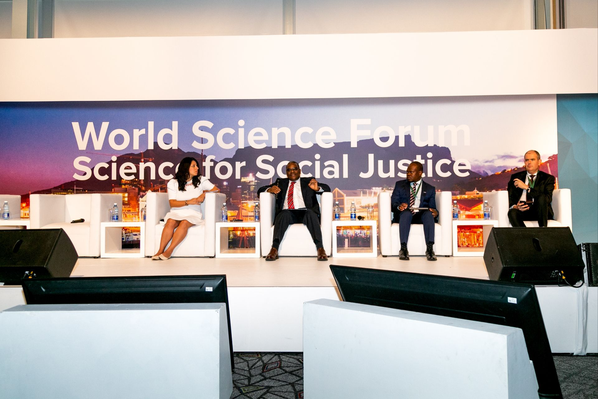At the World Science Forum in 2022, Clarissa Rios Rojas spoke at the plenary session on Science for Dipolmacy and at the closing ceremony.
On 8th December on the panel of the plenary session "Science for Diplomacy - How can Science Reboot Multilateralism and Global Solidarity?", Clarissa made four main suggestions on how to improve multilateralism to solve complex, global and intergenerational risks:
- Systems Thinking
Although we are trained to specialise and become good at one topic, we must reflect on the need to develop a system thinking lenses so we can conduct holistic analysis and innovative solutions to a bunch of problems. Complementary to this approach is creating Science-Policy interfaces where experts from both worlds can collaborate and co-create solutions. The next level to that is to build a Science-Policy-Industry-Citizen interface. - Policy Transfer Offices
Scientists at universities are asked to do everything: teach, research, high-impact publications, get grants, great communicators, get involved in policy and more. This thinking is unsustainable and unfair. Universities could think about creating Policy Transfer Offices that translate complex scientific publications into policy opportunities. At the same time, they also have to offer clear career growth opportunities for the Policy Officers they will hire. Have clear routes for job promotions where policy outputs (reports, briefs, government work, etc.) are valued at the same level as scientific publications. - Global South voices
There is a craving for incorporating the views and potential solutions of experts in the Global South. Yet, many barriers exist, such as language, networks, accessibility, visa processes, etc. Some of the things we can do to counteract this include:
- Global South quota. Bring geographical diversity to your research.
- Include a budget for translators so you can bring more perspectives to your work.
- Host events (such as the World Science Forum in Jordan or South Africa) so we can have more participants from the global south, and the rest of the participants can be directly exposed to your research/work.
- If you can't bring some participants, get their perspectives on a video and play them during your workshop/event to set the scene for the rest. - Let's move from knowledge into action
Most conferences or reports are 90% problem description and 10% discussion of policy ideas or solutions (mostly very general). Let's focus instead on learning from each other:
-What is working in your country? which policy solution made that happen? How did you implement it? Can we repeat that research/policy idea in other places?
-Let's discuss case studies. What can we learn from them? what can we do better?
-Let's make reports where we spend 10% describing the problem and 90% discussing policy ideas with a clear route to implementation.
